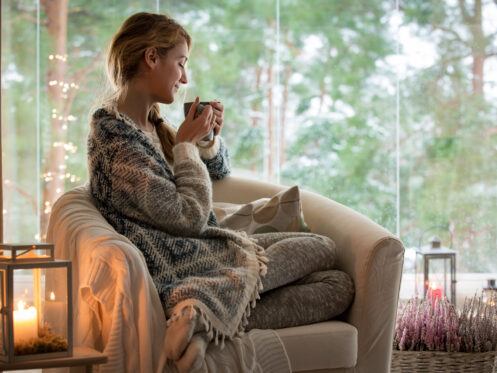Boilers are one of the more interesting heating options for homes and businesses. Especially with the rise of modern solutions emphasizing efficiency, boilers can provide a uniquely even level of heating at a good price. With multiple models on the market, buyers may be a bit confused about which way to go. Focusing on efficiency, here is a look at what you should know about boilers and the possible options.
How Boilers Work
Using fuel or electricity, a boiler heats a main chamber that transfers heat to an exchanger. The heat exchanger connects to pipes with lines that run throughout a building. These lines pass through walls and floors to baseboard heaters, radiators and under-floor systems that emit the heat into the living space. As the water cools, it passes through a return loop to be heated again.
Using a closed-loop system has a number of advantages. If you talk to anyone who has ever had a boiler before, they will rave about how steady the heating is. Radiant heat from boilers stays in the lines for a good period following each heating cycle. Especially if you never liked the on-off cycles of furnaces, you will appreciate having a boiler.
Understanding Boiler Efficiency
For home and business owners, the big efficiency rating is annual fuel utilization efficiency (AFUE). The AFUE tells you the total percentage of the heat that goes into warming a space. Notably, the AFUE accounts for the efficiency of the main boiler mechanism and how much heat escapes through pipes, chimneys and other areas.
A higher AFUE is always better. 90% efficiency is a good baseline for shoppers to understand what they should expect from a modern model with an efficient design. However, some models achieve AFUE levels of 95% or more.
Traditional Boilers
Folks who have negative opinions of boilers often have them because of older models that had AFUE ratings in the 60% to 70% range. Modern variants have to meet mandated minimum AFUE ratings, so you can expect a new one to operate at about 85%. Most traditional units use natural gas as their fuel source.
The main selling point of a traditional model in today’s market is the upfront cost. These models are often $1,000 to $2,000 cheaper. Many can easily retrofit into older buildings with chimneys, especially if the structure already has a boiler. These systems perform well in extreme cold, but they also tend to cost customers hundreds of dollars more to operate per year.
Condensing Boilers
Water vapor in vented flue gases tends to be the main source of heat loss in a traditional boiler. However, condenser technologies allow the most efficient modern models to capture most of this heat before it escapes your home. Using a secondary heat exchange, the system can then cycle the heat back into your home or business. Condensing boilers also require a management system to neutralize captured condensates before sending them down a drain.
Depending on your choice of model, you can expect a condensing boiler to have an AFUE between 90% and 98%. The most aggressively efficient models use low-temperature operation with the water at about 130 degrees Fahrenheit.
Depending on how much you use the boiler and your current natural gas fuel costs, using a condensing system likely means between $300 and $500 worth of savings per heating season. Consequently, you can expect a condensing boiler to pay back its greater upfront cost in about five to eight years. However, there are often tax incentives and utility rebates to defray much of the cost difference of a condensing boiler. Our company also has financing options available upon credit approval for installations.
Notably, condensing boilers tend to last longer than traditional models do. A traditional boiler usually has a service life of 15 to 20 years, while you can usually expect a condensing boiler to last about 25 years.
Combi Boilers
Combination boilers, often known as combi boilers, serve as heating systems and water heaters. Taking advantage of the boiler as a water source allows you to save space and simplify your plumbing and heating systems. Most models can provide 3 to 5 gallons of hot water per minute. These models typically use the condensing method, but they are slightly less efficient because of the demand for supplying hot water to the plumbing system. You can expect a combi to achieve about 90% to 94% efficiency. However, combis often contribute savings by eliminating water heater tanks.
Oil-Fired Boilers
Oil-fired boilers are the middle-ground option. They hit AFUE ratings of 85% to 90% and are mostly popular in places where natural gas isn’t available. Some high-end models push 95% efficiency by using variable-speed motors and modern fuel atomization. The main downside to an oil-fired boiler is the need to store oil onsite, with 275 gallons as the baseline.
Electric Boilers
Electric boilers offer the highest AFUE because heat exchange is close to 100% efficient. However, there are typically energy losses associated with power transmission. Depending on the boiler’s design and the local electrical conditions, this can induce an efficiency loss of 25% to 30%. Electricity costs tend to represent the biggest downside, but an electric boiler can be an especially appealing choice if you have access to solar power.
Hybrid Boilers
A hybrid boiler typically combines a condensing gas boiler with a heat pump. This combination often yields an AFUE of about 97%. A big advantage of a hybrid boiler is that the heat pump does all the work on cool and mild days, with the boiler only kicking on when the weather gets very cold.
Efficiency Factors
While the type of boiler makes a big difference, other factors also affect efficiency. You also want to be sure your boiler is the right size for your building. An oversized boiler can spend more energy keeping water hot. An undersized system may cycle more often, reducing the primary benefit of a boiler, its steady heat. You also want your boiler to have a well-designed pipe system to ensure most heat gets to the living spaces.
Annual maintenance is a big factor with boilers. Keeping lines clear of scaling can improve efficiency by at least 10%.
Adding a zoned HVAC system can improve efficiency, too. Setting up zones is easy with modern boilers because you can control how water flows to specific rooms.
The Verdict
Our HVAC technicians typically recommend installing the most efficient condensing model that fits your budget. If you’re intrigued by a combi boiler, that is a good choice, too. A hybrid is also an excellent choice if you’re interested in adopting a heat pump.
Electric is only desirable if gas is unavailable where you are. Oil-based boilers are rare in Louisiana and much of the South. We almost always recommend that customers avoid traditional boilers, too.
Bobby L. Greene Plumbing, Heating & Cooling Co. is here to help anyone in Shreveport, LA, and the surrounding areas who wants to set up a boiler or another heating system, so contact us today. Whether you need plumbing services or HVAC services, you can count on Bobby L. Greene Plumbing, Heating & Cooling Co..

